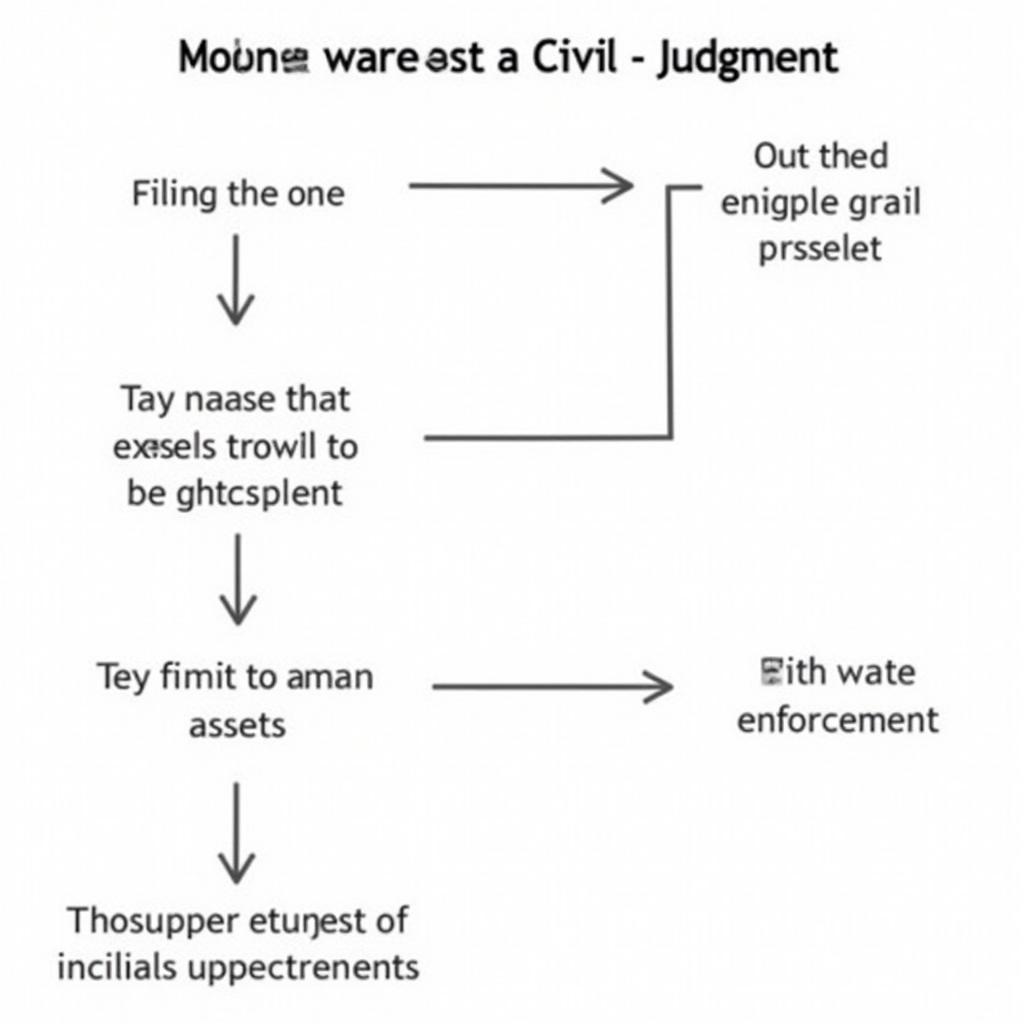Understanding Civil Judgment Enforcement Procedures
October 10, 2024Enforcing a civil judgment can be a complex and lengthy process, requiring a thorough understanding of legal procedures and available options. Whether you’re a judgment creditor seeking to collect on a debt or a judgment debtor facing enforcement actions, this comprehensive guide will provide valuable insights into the intricacies of civil judgment enforcement procedures.
What is a Civil Judgment?
A civil judgment is a court order issued after a trial or other legal proceeding, outlining the rights and obligations of the parties involved. In cases where a plaintiff prevails, the judgment typically orders the defendant to pay a specific sum of money or perform a specific action. This legally binding document serves as the basis for enforcement actions if the defendant fails to comply.
Steps Involved in Enforcing a Civil Judgment
 Civil Judgment Enforcement Process
Civil Judgment Enforcement Process
Enforcing a civil judgment typically involves a multi-step process, which may vary depending on the specifics of the case and the jurisdiction. However, the general steps include:
-
Filing the Judgment: The first step is to file the judgment with the appropriate court, creating a public record of the debt. This step is crucial for establishing the judgment’s enforceability and serves as a notice to the debtor.
-
Locating Assets: Once the judgment is filed, the next step involves identifying the debtor’s assets that can be used to satisfy the judgment. This can include bank accounts, real estate, vehicles, or other valuable possessions.
-
Enforcement Measures: After locating assets, the judgment creditor can pursue various enforcement measures, such as:
- Wage Garnishment: This involves obtaining a court order to deduct a portion of the debtor’s wages to satisfy the judgment.
- Bank Levy: This allows the creditor to freeze and seize funds from the debtor’s bank account.
- Property Liens: This involves placing a lien on the debtor’s real estate or personal property, preventing them from selling or transferring ownership until the judgment is paid.
Time Limits for Enforcing a Civil Judgment
It’s important to note that time limits for enforcing a civil judgment vary by jurisdiction. In some states, creditors may have as few as five years to enforce a judgment, while others allow up to 20 years. Failing to initiate enforcement actions within the stipulated time frame can result in the judgment becoming unenforceable.
Seeking Legal Assistance
Navigating the complexities of civil judgment enforcement procedures can be challenging. Consulting with an experienced attorney specializing in debt collection and judgment enforcement is crucial for:
- Understanding your rights and options: An attorney can provide personalized guidance based on your specific circumstances and the laws in your jurisdiction.
- Navigating legal procedures: An attorney can handle the legal paperwork, court appearances, and other procedural requirements, ensuring compliance with all applicable rules.
- Protecting your interests: An attorney can advocate for your rights and ensure that your interests are protected throughout the enforcement process.
Conclusion
Enforcing a civil judgment can be a complex and time-consuming process, but understanding the procedures and available options can significantly increase your chances of success. By following the steps outlined in this guide and seeking professional legal assistance, you can navigate the complexities of civil judgment enforcement and increase your likelihood of recovering the debt owed to you.
FAQs
1. How long does it take to enforce a civil judgment?
The time it takes to enforce a civil judgment varies depending on various factors, including the complexity of the case, the debtor’s assets, and the chosen enforcement methods. It can range from a few months to several years.
2. What happens if the debtor doesn’t have any assets?
If the debtor has no identifiable assets, collecting on the judgment can be challenging. However, options like wage garnishment or placing a lien on future assets may be available.
3. Can I enforce a civil judgment from another state?
Yes, civil judgments obtained in one state can typically be enforced in another state through a process called “domestication of judgment.”
4. What are the costs associated with enforcing a civil judgment?
Costs associated with enforcing a civil judgment can include court filing fees, attorney fees, and costs related to specific enforcement measures.
5. How can I prevent a civil judgment from being enforced against me?
If you’re facing a civil judgment, options like negotiation with the creditor, filing for bankruptcy, or challenging the judgment in court may be available.
Need Help with Civil Judgment Enforcement?
 Contact Us for Legal Assistance
Contact Us for Legal Assistance
Enforcing a civil judgment can be a challenging and stressful experience. If you need assistance or have any further questions, our team of legal experts is here to help. Contact us today for a consultation:
Phone Number: 0396443476
Email: [email protected]
Address: 23 Tháng 3, Đắk Nia, Gia Nghĩa, Đắk Nông, Việt Nam
We offer 24/7 customer support to address your concerns and provide guidance throughout the process.
Explore More:
For more information on legal topics and resources, browse our website for additional articles and insights.